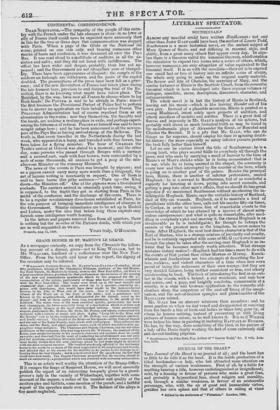LITERARY SPECTATOR.
SOUTHENNAN.•
ALMOST any novelist could have written gOidheiznan : not offd other than Jotter GALT could have been the authof of Laurie Todd. Southennan is a mere historical novel, on the aneient subject of Mary Queen of Scots, and not differing in manneire style, and ability, from a great many others that appear every day; In alge- bra there is a theorem called the binomial theorem, whieff enables the calculator to expand two terms into a series of others, 'which, however numerous, are only altogether of value equivalent fe the binomial itself. It is so with the novelists—theirart is to mond one small fact or two of history into an infinite series of atonls, the whole only going to make up the original scanty material, The favour and fate of Chatelar, the secretary of Mary, and the similar fortunes of Rizzio in the Scottish Court, form the romantic binomial which is here developed into three copious volumes of dialogue, anecdote, scene, description, discussion, character, and antiquarianism. The whole novel is in fact the history of Rizzio in Scotland, leaving out his music—which is like leaving Hamlet out of his own play. Instead of a plausible musician, Rizzio is painted as a young Machiavel, intent solely upon projects of ambition, and utterly mindless of motetts and ariettes. There is a great deal of finesse and ingenuity in Mr. GAVr's analysis of his actions, but probably with about as much historical truth as may be found in the melodramatic plays of Alexander the Great, or Boscobel and Charles the Second. It is a pity that Mr. GALT, who can do things so far superior, should employ his time in spinning doubt- ful lustory : the more especially as many inferior persons perform the task fully better than himself. Let no one be curious about the title of Southennan: he is a young laird, who plays second fiddle to everybody all through the piece, and who ends by marrying a maid of honour to the tune of Rizzio's or Mori's shrieks while he is being assassinated: that is to say, while he is being married in the chapel, the ceremony is every now and then interrupted by the murder of the hero, which is going on in another part of the palace. Besides the principal hero, Rizzio, there is another of inferior pretensions, named Hughock: he is a servant to Southennan, but of so wonderful a capacity for listening at doors, prying into secret councils, and getting a peep into other men's affairs, that we should do him great injustice if we mentioned Southennan without mentioning the in- defatigable Hughock. Rizzio, says the veritable history of Scotland, died of fifty-six wounds. Hughock, as if to maintain a kind of parallelism with the other hero, call § out his master fifty-six times, by Cocker, in order to inform him of remarkable events to the knowledge of which he has attained by a species of almost mira- culous omnipresence : and what is quite as remarkable, after med- dling in everybody's plot and marling it, the eternal Hughock is as invulnerable as he is indefatigable; for though he betrays the secrets of the greatest men in the kingdom, he' never comes to harm. After Hughock, the next best drawn character is that of the Earl of Morton, who is a strange mixture of jocularity and cruelty, and he is certainly supported with some of Mr. GALT'S own humour though the place he takes after the serving-man Hughock is so in- ferior that lie becomes scarcely worth attention. What strange mistakes history makes !—Hughock had ten times more to do with the events of that period than either Morton or Murray. Knock- whinnie and Auchenbrae are two attempts at describing the law- less, reckless, and violent characters of a time when men were proud of being the redressers of their own wrongs : but they are very decided failures, being neither consistent or true, and utterly uninteresting to boot. The trick of introducing the first as an out- law in the woods, with a helmet, a red waistcoat, and rude how and arrow, and a page, and knightly wardrobe, summonable at a whistle, is a stale and tiresome application to the romantic old- cloathes shop, the emporium of the cast-off finery of the imagi- nation, and the out-of-fashion spangles and plate-buckles of the RADCLIFFE school.
Mr. GALT has no sincerer admirers than ourselves : and he must pardon us when we feel vexed and disappointed at receiving from his hands a tale of lords and ladies in times long gone by, of whom he knows nothing, instead of presenting us with living pictures of human nature, as he well knows it. It is as:if WTILKIn were to lose his time in painting in imitating RAPHAEL or RUBENS. He has, by the way, done something of the kind, in his picture of a lady of the Doria family washing the feet of some extremely stiff and devout-looking pilgrims.
• Southennan, by John Galt, Esq. Author of "Laurie Todd," &c. 3 vols. Lou- don, 1830.


























 Previous page
Previous page